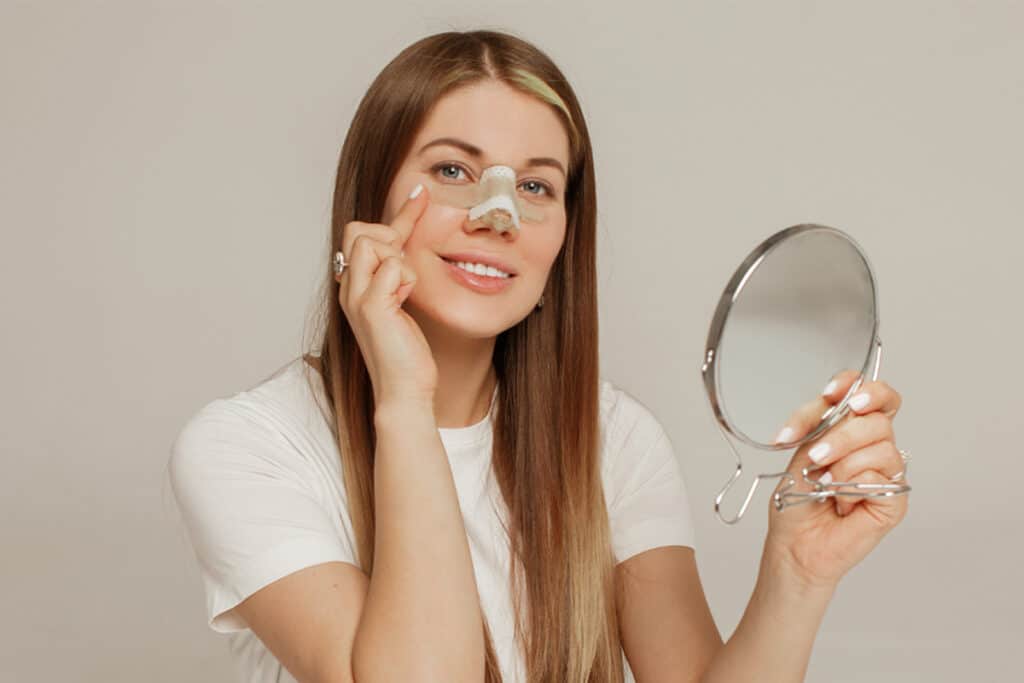Rhinoplasty, commonly referred to as a “nose job,” is a surgical procedure in which the shape of the nose is altered through the restructuring or removal of bone or cartilage. The healing process after a rhinoplasty surgery can be long and uncomfortable, with swelling being one of the most common side effects.
Fortunately, there are various techniques available that can assist in decreasing swelling and promoting healing following rhinoplasty in New Jersey. This article will discuss various methods of managing and reducing swelling post-rhinoplasty surgery.

Reasons for Swelling After Rhinoplasty
Swelling is a common side effect of rhinoplasty and is caused by the manipulation of the nasal bone and nasal skin during the surgery. During the recovery process, patients should expect some degree of swelling in the region where the surgery was performed. This postoperative condition typically lasts for several weeks but may persist for months after the surgery depending on the individual patient’s healing progress.
Tips on Reducing Swelling Post-Rhinoplasty Surgery
The postoperative swelling experienced after a nose job can be uncomfortable. To help manage the swelling during the rhinoplasty recovery process, patients are encouraged to follow these tips:
Follow All Post-Surgery Instructions Carefully
Facial plastic surgeons are highly trained professionals who specialize in rhinoplasty procedures. Following surgery, New Jersey rhinoplasty patients need to follow the instructions of their facial plastic surgeon closely to ensure optimal healing and reduce swelling.
These instructions may include wearing a nasal splint or cast, sleeping with the head propped on pillows, and taking medications as prescribed by the surgeon. Adhering strictly to post-operative care instructions can help minimize swelling and improve the overall outcome of the procedure.
Rest and Avoid Strenuous Activities
Getting plenty of rest is an essential part of the postoperative recovery process following a rhinoplasty procedure. Having sufficient rest helps to reduce stress levels and promote healing in the area, as well as reducing postoperative swelling. Try to get at least 8 hours of sleep each night and try to avoid physical activities that may cause further strain on the area while it is still healing.
It is important to avoid strenuous activities or contact sports for at least several weeks or months. Major surgery such as rhinoplasty can cause serious complications if the patient engages in physical activities before the body has completely healed. Engaging in contact sports too soon after the procedure can also cause an increase in swelling, so it is best to wait until your surgeon clears you to engage in such vigorous activities.
Keep Your Head Elevated
To help reduce facial swelling, keep your head elevated while sleeping as this helps to improve blood circulation in the area and allows fluid to drain more effectively. Sleeping on pillows or using an adjustable bed can help keep your head and neck raised, allowing for improved drainage and better healing outcomes.
Use Ice Packs and Cold Compresses
Using a cold compress can help reduce swelling and postoperative bruising around the nose after a rhinoplasty procedure. Keeping cold compresses in the area for 10-15 minutes at a time several times a day during the first couple of weeks following cosmetic surgery can help promote healing. Additionally, when placed across the bridge of the nose, it may also help to reduce the discomfort after rhinoplasty.
It is recommended that patients wrap the ice pack in a clean towel to prevent skin damage and potential ice burns. Additionally, it is necessary to take regular breaks from using the ice pack as too much cold can cause increased swelling and discomfort around the area of surgery.
Drink Plenty of Water

Drinking plenty of water and maintaining a balanced diet can help improve blood flow and reduce swelling after a rhinoplasty procedure. Water helps flush out toxins from the body, which can help to reduce postoperative swelling. Additionally, eating a balanced diet that is high in protein and low in salt can also be beneficial as it helps promote tissue repair, and reduces inflammation. Avoiding foods high in sodium such as processed and canned foods will help reduce fluid retention in the body and keep swelling under control.
A healthy lifestyle filled with lots of water, exercise, and a balanced diet will assist in the healing process following a nose job. Don’t forget to inform your doctor about any supplements or medications they are taking as these may affect postoperative healing.
Stop Smoking and Drinking
Patients have to avoid smoking and drinking alcohol for several weeks after rhinoplasty surgery, as these activities can increase swelling and interfere with the healing process. Smoking narrows blood vessels, which can restrict blood flow to the area of surgery and lead to prolonged post-operative swelling. Additionally, alcohol consumption may cause an increase in blood pressure, thus further exacerbating the effects of swelling following rhinoplasty.
Keep Your Nasal Passages Open
Another way to reduce swelling is to keep the nasal passages open. This can be done by using a saline rinse or a gentle nasal spray every day for the first week following rhinoplasty surgery.
Try to not Sneezing and Coughing
Avoid sneezing and coughing during the early stages of healing after rhinoplasty surgery, as these can cause increased post-op swelling and nasal congestion. Postoperative swelling is often at its highest levels in the first month after the procedure but can take up to six months or more to fully resolve.
Nasal congestion may also be experienced during this time as well, due to the presence of swelling in the nasal passages. To ease symptoms, patients should use a saline nasal rinse several times a day for several weeks following their surgery. It is also recommended that patients refrain from engaging in activities that may trigger sneezing or coughing while they are still healing.
Additionally, crying produces an increase in pressure within the nasal cavity, which can cause further swelling and discomfort in the area after surgery. Blowing your nose can also be problematic as it may disrupt the delicate post-operative area and lead to increased swelling. If you feel like you need to cry or blow your nose, it is important to do so with caution by taking shallow breaths and applying gentle pressure on the area.

Stay Positive and Be Patient
Recovering from rhinoplasty New Jersey can take a considerable amount of time, and it is crucial to maintain a positive mindset throughout the healing process. Swelling after the operation is typical and may last for up to six months or more. It is essential to be patient and keep in mind that the post-operative stage will eventually come to an end.
Uneven Swelling After Surgery
It is not uncommon for patients to experience uneven swelling after rhinoplasty surgery. This can happen due to how the skin and tissue are manipulated during the procedure, or due to healing at different rates on each side of the nose. If this happens, it is important to remain patient as it will likely even out over time. However, if the uneven swelling persists after six months, patients should reach out to their doctor for further advice.
Recovering from rhinoplasty surgery can be challenging, but lifestyle changes such as quitting smoking and alcohol, keeping nasal passages clear, avoiding sneezing and coughing, staying positive, and getting rest can help speed up the recovery process.
Get an appointment with a Rhinoplasty expert!
If you’re considering a cosmetic rhinoplasty and want to learn more about the recovery period, contact Dr. Joanna Kam today! With extensive experience in facial plastic surgery, she can answer any questions or concerns you may have about the procedure and will help make sure your recovery is as smooth as possible. Schedule an appointment and get started on your journey to a more beautiful you!
